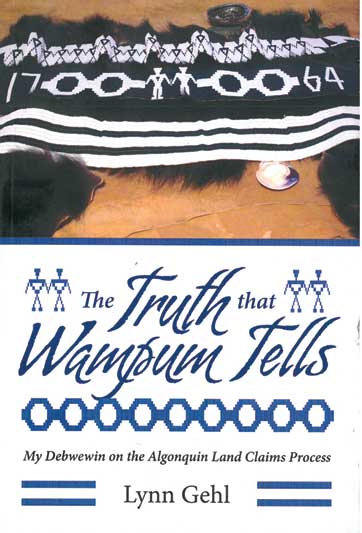Jeff Green | May 22, 2014
The Truth that Wampum Tells: My Debwewin on the 
Algonquin Land Claims process, by Lynn Gehl.
Ever since the draft Agreement in Principle to the Algonquin Land Claim was released in late 2012, there have been political debates and controversies among non-Algonquin political groups, ranging from township councils, to the Ontario Federation of Anglers and Hunters, the Federation of Ontario Cottage Associations and others.
The issues that have been raised range from the specific lands that are included in the claim, the nature of the transfers, and more. At some of the public meetings things were said that revealed a level of mistrust and resentment, an uncomfortable level in many cases.
Later in 2013 it came out publicly that a large number of people in the Sharbot Lake area, members of the Shabot Obaadjiwan First Nation, some of them in leadership roles, had been removed as Algonquin electors by virtue of an appeal process that determined their Algonquin descendency is unproven. The fallout from this devastating process has been dealt with internally by the Shabot Obaadjiwan and local families
Meanwhile a ratification vote on the Agreement-in-Principle is still pending.
Into this context comes a book by Dr. Lynn Gehl, based on her doctoral thesis, which not only looks at Algonquin history but also details the first 15 years of the Algonquin Land Claim process, a process she walked away from in 2005. As readers of the Frontenac News will know, Dr. Gehl is not the only Algonquin person to walk away from the Land Claim process in recent years.
Dr. Gehl's book is the second fully researched book on the land claim and its underpinnings, following "Fractured Homelands" by Bonita Lawrence.
Gehl calls her book “My Debwewin on the Algonquin Land Claims Process”, and she explains what a Debwewin is in the forward to the book. The concept is complicated, but in the most simple sense it refers to the knowledge of the heart and knowledge of the mind, although it might be more accurate, in the case of this book, to talk about knowledge of the self gained by experience mixed with a rigorous academic examination of source material.
As in the Lawrence book, those Algonquins who oppose the direction that the land claims process has taken are easy enough to find and quote, whereas those who are internal to the process do not speak. For several years there has been agreement among negotiators not to talk about the process except in a very prescribed manner.
The Truth that Wampum tells weaves Gehl's own life story with some historical background about how the Ontario Algonquins developed and how the land claim got its start. As a close descendent of people who were born and raised at Pikwàkanagàn, Gehl has a unique perspective on that community and on how the Indian Act defines native status.
The book is also a step by step account of the twisted path of the land claim from the late 1990s until 2005. It ends just after the initial impact of the current chief negotiator and legal counsel to the claim, Robert Potts, who came on in 2005.
The Truth that Wampum tells is an essential read for those interested in the background to any of the current debates about where the land claim is going, and it also clearly delineates how hunting agreements entered into by the Ministry of Natural Resources and the leaders/chiefs who are negotiating the claim have played a significant role.
Anyone who is interested in the role of 'blood quantum' in the land claim, the very different world views of the Pikwàkanagàn Council and the 'non-status' negotiators who have been sharing a negotiating table for many years now, and the continuing impact of colonialism on Aboriginal communities of all kinds, will find a unique perspective in Dr. Gehl's Debwewin.
For information about The Truth that Wampum Tells, contact Lynn Gehl at Lynngehl@gmail.com
More Stories
- Harrowsmith Public School and the Magic of Theatre
- You’re a Good Man Charlie Brown – a school wide effort at SHS
- Leadership From Within
- New Bulk Water Station in Sydenham
- Frontenac County Council looks at Healthcare Recruitment
- Good Turn Out Maple Fest Despite Rain
- Future looking brighter for Denbigh Fire Department says Chief
- Local Favourites featured at 2nd Annual SF Music Festival
- Perth Festival of the Maples, Saturday, April 27
- South Frontenac Council
